What is Business Buyer Behaviour?
Business buyer behaviour refers to the buying behaviour of organizations that buy goods and services for use in the production of other products and services that are sold, rented or supplied to others.
Organisational buying or Institutional buying or Business-to-business (B2B) buying is defined as a process by which a company or organisation establishes a need for purchasing products, collects information and evaluates product and services among competing brands and suppliers to take a final purchase decision.
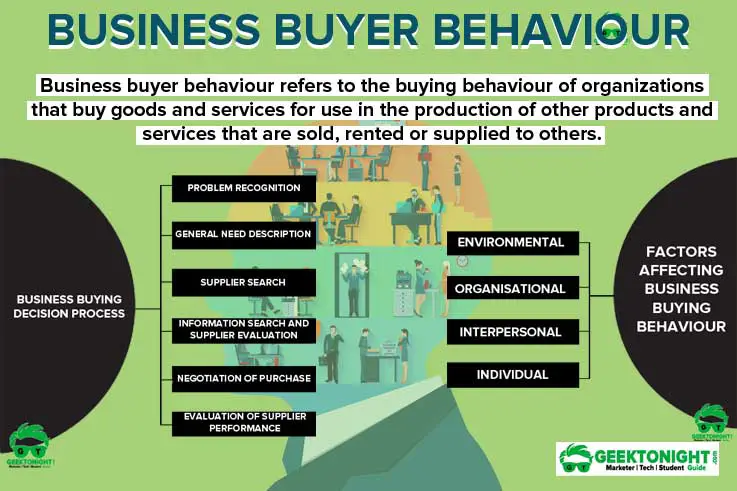
Table of Content
Organisations buy products and services for their corporate use and also use them in their production process to build a final product or service for end consumers. Organisational buying is also called institutional buying and when the products are used in their own production process, the buying process is called industrial buying.
Organisational buying is, in a few ways, similar to individual consumer buying because it is not the organisation making the buying decisions but people at different levels of the organisation are involved in the buying process.
Roles and Responsibility of Buying Centres
Industrial marketer task is to identify those individuals who are involved in purchasing decision process.
- Buying centre: All the individuals and units that play a role in the purchase decision-making process.
- Initiators: People who request for something to be acquired or purchased.
- Users: They use the products thus, initiating the purchase process.
- Influencers: Individuals in the organisation, influence the decision-making process by providing information on criteria for buying e.g. Research and Development specialists.
- Deciders: Member in the organisation who have the decision-making power about the purchase. e.g. engineers deciding specifications or vice-president (finance).
- Gatekeepers: Organisation members who have the power to prevent sellers or information from reaching the members of buying centres e.g. purchasing agents, receptionist, secretaries and telephone operators.
- Approvers: Member in the organization who authorise the purchase.
- Buyers: People in the organization who have formal authority to select the suppliers and arrange the purchase terms.
Read: Market Segmentation | Definition, Types, Bases, Examples
Buying Motives of Business Buyers
- Efficiency: In performance, practicability and increased capacity
- Economy: In money, in use or in time
- Good Quality: In materials and workmanship
- Simplicity: In construction, operation and application
- Saleability: In increasing saleability of the user’s product
- Ease of operation: In easier handling, greater convenience, handiness
- Space saving: In compactness, ease for storage and holding
- Obsolescence: In which it needs improvement, replacement or additions
- Safety: In providing safety to employees, clients and customers
- Cleanliness: In a plant, user’s product, or for the workmen
Business Buying Decision Process
Business buying is best viewed as a decision process, the steps that make up the process differ across companies and products.
The business buying decision process stages are described below:
- Problem Recognition
- General Need Description
- Supplier Search
- Information Search and Supplier Evaluation
- Negotiation of Purchase Orders
- Evaluation of Supplier Performance
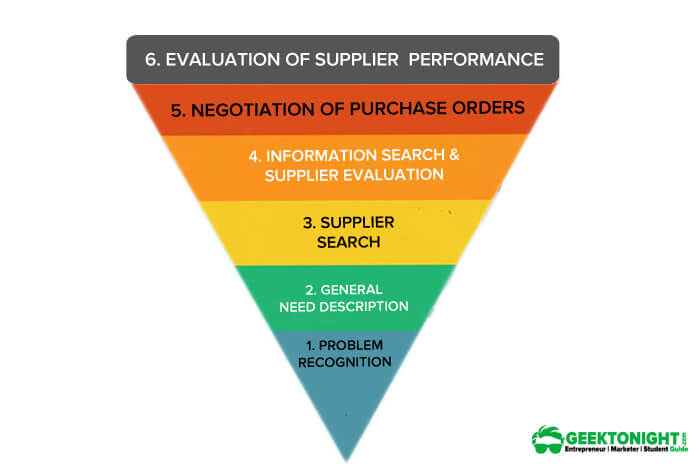
Problem Recognition
Organisational purchasing starts with the identification or recognising a need that can be met by acquiring a good or service.
General Need Description
The stage in the business buying process in which a buyer determining product specifications like general characteristics and quantity of a needed item.
Supplier Search
The stage of the business buying process in which the buyer tries to Identifying best suppliers/vendors.
Information Search and Supplier Evaluation
A buying centre may have to evaluate several product types for a particular use before suppliers can be selected.
Negotiation of Purchase Orders
An organisational buyer may negotiate a contractual agreement with a supplier. An agreement of this kind can cover a single purchase of a product or repurchase of the product over a period of time.
Evaluation of Supplier Performance
Organisational buyers usually assess the performance of the supplier and how well they comply with the purchase agreement. Thus, an important part of organisational purchasing is the evaluation of suppliers after purchase.
Types of Business Buying Situations
Three major types of business buying situations are:
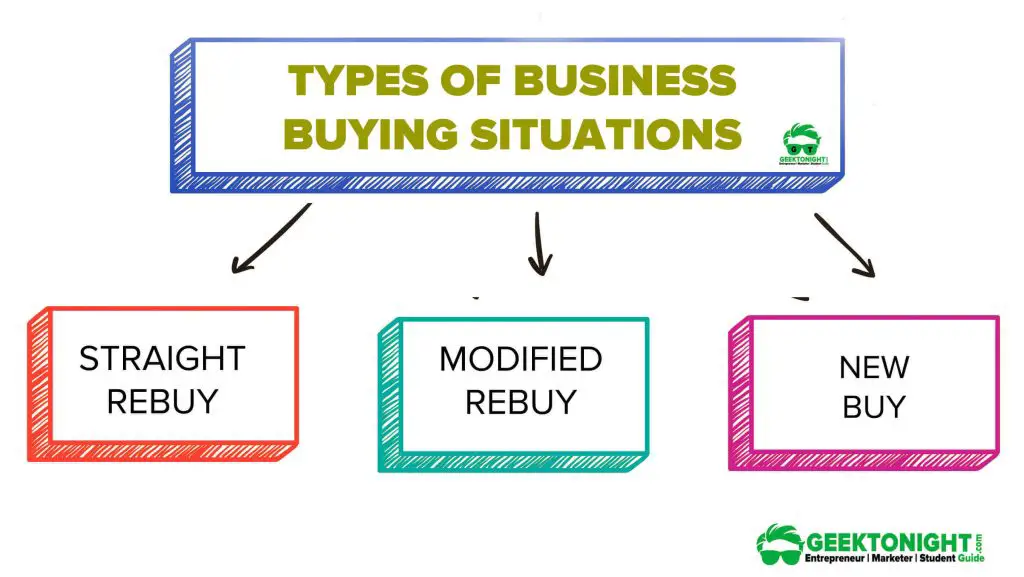
Straight Rebuy
A business buying situation is found when there is repetitive or routine order processing which is given by buyers to long-term suppliers.
Modified Rebuy
A business buying situation occurs when a buyer wants to modify any purchase, i.e., improvement in product specification, price reduction, change in terms and conditions.
New Buy
A business buying situation when a buyer purchases a product or service for the first time.
Read: Consumer Behaviour – Classification, Importance, Stages
Factors affecting Business Buying Behaviour
Organisational purchase decisions are influenced by the firm’s external and internal variables.
Four major factors affecting business buying behaviour decisions namely:
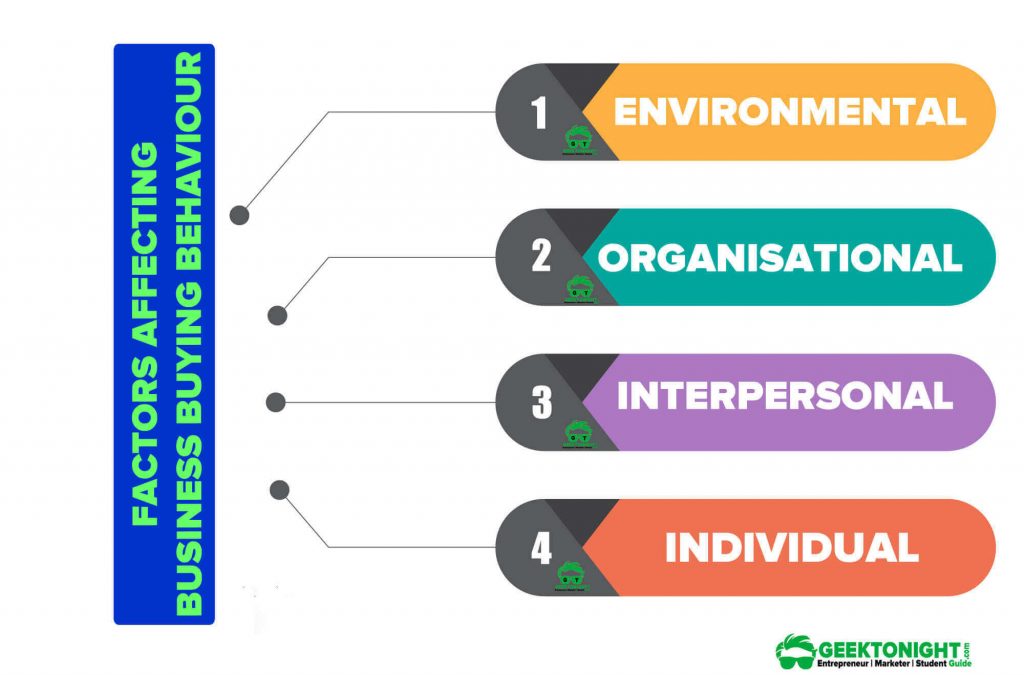
Environmental Variables
Among the various environmental variables, the influence of the state of the economy and other economic factors including government policy is the most important variable in organisational buyer behaviour.
Organisational Variables
Internal variables like culture and environment of an enterprise affect buying decisions. Every organisation follows systems and procedures for business buying.
These systems and procedures have developed over a period of time reflecting the culture, policies and practices, processes, structures and objectives of the enterprise.
Interpersonal Variables
The marketer needs to know who exerts the maximum authority and who would be able to persuade others to agree with his viewpoint.
Knowledge of group dynamics helps the marketer evolve his strategy on selling to the buying centre. The buying centre is a collection of different kinds of participants with different attitude levels and power dynamics among each other.
Individual Variables
People carry their motivations, perceptions, market knowledge and preferences while making purchase decisions.
Decision-making is also influenced by demographic variables like age, income, occupation, position in the company, and perception of risk involved in decision-making. These factors have a direct bearing on organisational buyer’s decisions.
Marketing Management Topics
Go On, Share & Tell Us What You Think!
Did we miss something in Marketing Management Tutorial or You want something More? Come on! Tell us what you think about our post on Business Buyer Behaviour in the comments section and Share this post with your friends.
Marketing Management
(Click on Topic to Read)
- What Is Market Segmentation?
- What Is Marketing Mix?
- Marketing Concept
- Marketing Management Process
- What Is Marketing Environment?
- What Is Consumer Behaviour?
- Business Buyer Behaviour
- Demand Forecasting
- 7 Stages Of New Product Development
- Methods Of Pricing
- What Is Public Relations?
- What Is Marketing Management?
- What Is Sales Promotion?
- Types Of Sales Promotion
- Techniques Of Sales Promotion
- What Is Personal Selling?
- What Is Advertising?
- Market Entry Strategy
- What Is Marketing Planning?
- Segmentation Targeting And Positioning
- Brand Building Process
- Kotler Five Product Level Model
- Classification Of Products
- Types Of Logistics
- What Is Consumer Research?
- What Is DAGMAR?
- Consumer Behaviour Models
- What Is Green Marketing?
- What Is Electronic Commerce?
- Agricultural Cooperative Marketing
- What Is Marketing Control?
- What Is Marketing Communication?
- What Is Pricing?
- Models Of Communication
Sales Management
- What is Sales Management?
- Objectives of Sales Management
- Responsibilities and Skills of Sales Manager
- Theories of Personal Selling
- What is Sales Forecasting?
- Methods of Sales Forecasting
- Purpose of Sales Budgeting
- Methods of Sales Budgeting
- Types of Sales Budgeting
- Sales Budgeting Process
- What is Sales Quotas?
- What is Selling by Objectives (SBO)?
- What is Sales Organisation?
- Types of Sales Force Structure
- Recruiting and Selecting Sales Personnel
- Training and Development of Salesforce
- Compensating the Sales Force
- Time and Territory Management
- What Is Logistics?
- What Is Logistics System?
- Technologies in Logistics
- What Is Distribution Management?
- What Is Marketing Intermediaries?
- Conventional Distribution System
- Functions of Distribution Channels
- What is Channel Design?
- Types of Wholesalers and Retailers
- What is Vertical Marketing Systems?
Marketing Essentials
- What is Marketing?
- What is A BCG Matrix?
- 5 M'S Of Advertising
- What is Direct Marketing?
- Marketing Mix For Services
- What Market Intelligence System?
- What is Trade Union?
- What Is International Marketing?
- World Trade Organization (WTO)
- What is International Marketing Research?
- What is Exporting?
- What is Licensing?
- What is Franchising?
- What is Joint Venture?
- What is Turnkey Projects?
- What is Management Contracts?
- What is Foreign Direct Investment?
- Factors That Influence Entry Mode Choice In Foreign Markets
- What is Price Escalations?
- What is Transfer Pricing?
- Integrated Marketing Communication (IMC)
- What is Promotion Mix?
- Factors Affecting Promotion Mix
- Functions & Role Of Advertising
- What is Database Marketing?
- What is Advertising Budget?
- What is Advertising Agency?
- What is Market Intelligence?
- What is Industrial Marketing?
- What is Customer Value
Consumer Behaviour
- What is Consumer Behaviour?
- What Is Personality?
- What Is Perception?
- What Is Learning?
- What Is Attitude?
- What Is Motivation?
- Segmentation Targeting And Positioning
- What Is Consumer Research?
- Consumer Imagery
- Consumer Attitude Formation
- What Is Culture?
- Consumer Decision Making Process
- Consumer Behaviour Models
- Applications of Consumer Behaviour in Marketing
- Motivational Research
- Theoretical Approaches to Study of Consumer Behaviour
- Consumer Involvement
- Consumer Lifestyle
- Theories of Personality
- Outlet Selection
- Organizational Buying Behaviour
- Reference Groups
- Consumer Protection Act, 1986
- Diffusion of Innovation
- Opinion Leaders
Business Communication
- What is Business Communication?
- What is Communication?
- Types of Communication
- 7 C of Communication
- Barriers To Business Communication
- Oral Communication
- Types Of Non Verbal Communication
- What is Written Communication?
- What are Soft Skills?
- Interpersonal vs Intrapersonal communication
- Barriers to Communication
- Importance of Communication Skills
- Listening in Communication
- Causes of Miscommunication
- What is Johari Window?
- What is Presentation?
- Communication Styles
- Channels of Communication
- Hofstede’s Dimensions of Cultural Differences and Benett’s Stages of Intercultural Sensitivity
- Organisational Communication
- Horizontal Communication
- Grapevine Communication
- Downward Communication
- Verbal Communication Skills
- Upward Communication
- Flow of Communication
- What is Emotional Intelligence?
- What is Public Speaking?
- Upward vs Downward Communication
- Internal vs External Communication
- What is Group Discussion?
- What is Interview?
- What is Negotiation?
- What is Digital Communication?
- What is Letter Writing?
- Resume and Covering Letter
- What is Report Writing?
- What is Business Meeting?
- What is Public Relations?
Business Law
- What is Business Law?
- Indian Contract Act 1872
- Essential Elements of a Valid Contract
- Types of Contract
- What is Discharge of Contract?
- Performance of Contract
- Sales of Goods Act 1930
- Goods & Price: Contract of Sale
- Conditions and Warranties
- Doctrine of Caveat Emptor
- Transfer of Property
- Rights of Unpaid Seller
- Negotiable Instruments Act 1881
- Types of Negotiable Instruments
- Types of Endorsement
- What is Promissory Note?
- What is Cheque?
- What is Crossing of Cheque?
- What is Bill of Exchange?
- What is Offer?
- Limited Liability Partnership Act 2008
- Memorandum of Association
- Articles of Association
- What is Director?
- Trade Unions Act, 1926
- Industrial Disputes Act 1947
- Employee State Insurance Act 1948
- Payment of Wages Act 1936
- Payment of Bonus Act 1965
- Labour Law in India
Brand Management



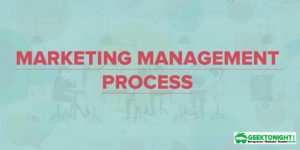



As I read it, it was a complete and concise article about, business buying behavior. it helped me too much. but; individual factors were new for me among the factors that can influence business buying behavior. tnx for your nice artical.